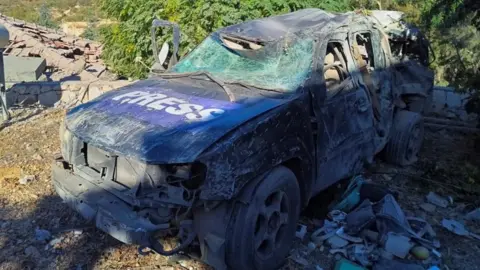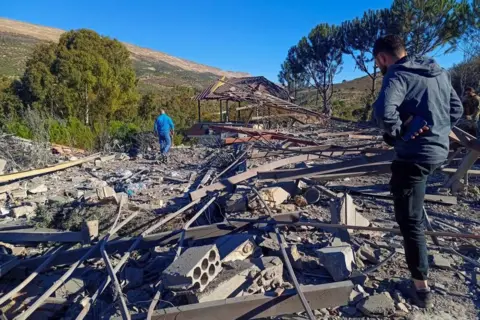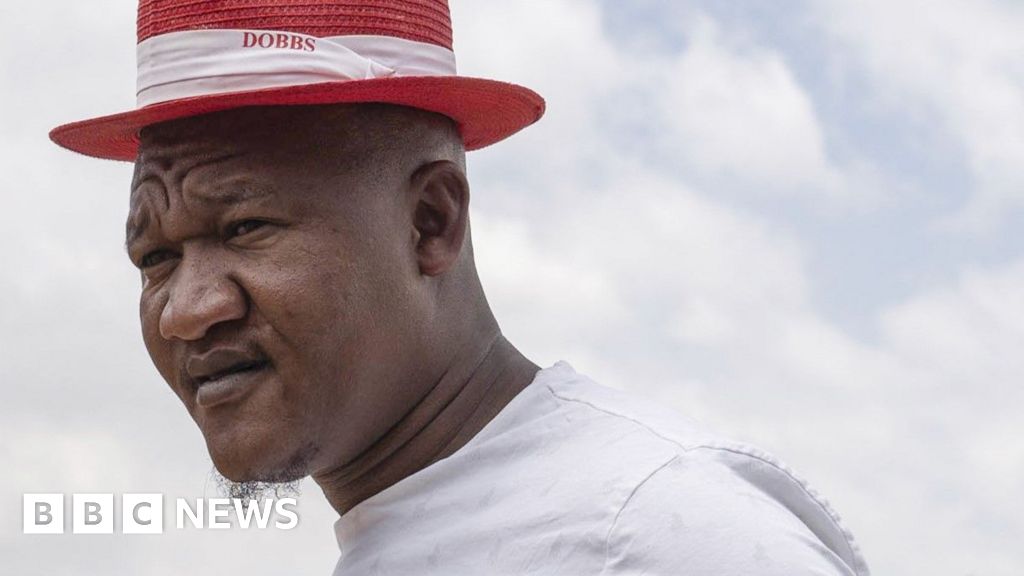ARTICLE AD BOX

 Reuters
Reuters
The compound contained vehicles clearly marked as press
Three journalists have been killed in an Israeli airstrike on a building known to be housing reporters in south-eastern Lebanon, witnesses have told the BBC.
The attack was carried out on a guesthouse in a compound in Hasbaya being used by more than a dozen journalists from at least seven media organisations - with a courtyard containing cars clearly marked with "press".
The three men worked for broadcasters Al-Manar TV and Al Mayadeen TV, which issued statements paying tribute to their killed employees.
Lebanon's information minister said the attack was deliberate and described it as a "war crime".
The Israeli military has not yet commented, but has previously denied targeting journalists.
Those killed were camera operator Ghassan Najjar and engineer Mohamed Reda from pro-Iranian news channel Al Mayadeen, as well as camera operator Wissam Qassem from the Hezbollah-affiliated Al-Manar.
The Lebanese ministry of health said three others were injured in the blast.
Five reporters had been killed in prior Israeli strikes in Lebanon, including Reuters journalist Issam Abdallah.
Footage broadcast by Al-Jadeed TV - whose journalists were also sharing the house - showed a bombed-out building with a collapsed roof and floors covered in rubble.
A vehicle used for TV broadcasts was overturned on its side, its satellite dish mangled with cabling nearby.
"All official parties were told that this house was being used as a stay-house for journalists. We coordinated with them all," an Al-Jadeed journalist, caked in concrete dust, said in a live broadcast while panting and coughing.
Lebanese journalists covering the conflict in the south of the country had to relocate from nearby Marj'youn to Hasbaya, as the former became too dangerous.

 Reuters
Reuters
Youmna Fawwaz, a reporter for broadcaster MTV Lebanon, told the BBC that journalists in the compound were awoken at around 03:00 local time (01:00 BST) by the strike.
She said ceilings had fallen in on them, and they were surrounded by rubble and dust, with the sound of fighter jets overhead.
Each news organisation had their own building in the compound, she said, and the building housing the Al Mayadeen reporters was "obliterated" while al-Manar employees were inside.
Ms Fawwaz said it was a media compound known as such to both Israel and Hezbollah.
"The airstrike was carried out on purpose. Everyone knew we were there. All the cars were labelled as press and TV. There wasn't even a warning given to us."
She added: "They are trying to terrorise us just like they do in Gaza. Israelis are trying to prevent us from covering the story."
Lebanon's information minister accused Israel of intentionally targeting journalists, in contravention of international law.
"The Israeli enemy waited for the journalists' nighttime break to betray them in their sleep," Ziad Makary wrote in a post on X.
"This is an assassination, after monitoring and tracking, with prior planning and design, as there were 18 journalists there representing seven media institutions."
Hasbaya, about five miles (eight kilometres) from the Israeli border, is inhabited by Muslims, Christians, as well as people from the Druze ethnic and religious minority.
It has seen attacks on its peripheries in recent weeks, but this was the first strike on the settlement itself.
The attack comes as part of an expanding conflict in Lebanon, where Israel has been intensifying air strikes for weeks - as well as launching a ground invasion on border towns and villages in the south.
Lebanese authorities have recorded over 1,700 air strikes across the country in the past three weeks.
Hostilities broke out between Israel and Hezbollah on 8 October last year, the day after Hamas's attack on Israel that killed around 1,200 people. The Iran-backed armed group has since been firing rockets and drones into Israel in what it described as "solidarity" with Palestinians in Gaza.
Nearly 2,600 people in Lebanon have been killed in the current conflict, according to the country's health ministry - many of the deaths occurring since Israel began escalating its attacks on 23 September.
Around 60,000 people in northern Israel have been displaced by Hezbollah rocket fire, and the Israeli government has declared returning them to their homes to be a key objective.
In southern Lebanon, satellite imagery examined by the BBC shows Israel's intensified bombing campaign has caused more damage to buildings in two weeks than occurred during a year of cross-border fighting.
Data shows that more than 3,600 buildings in Lebanon appear to have been damaged or destroyed between 2 and 14 October - about 54% of the total damage.
The attack comes days after the Israeli military accused six Al Jazeera journalists working in northern Gaza of being affiliated with Hamas or other armed Palestinian groups.
The Qatari broadcaster said it denies and "vehemently condemns" the allegations.
According to the Committee to Protect Journalists, at least 123 Palestinian journalists and media workers have been killed in Gaza since Israel launched a war in the territory last year.
Gaza's Hamas-run health authority has reported more than 42,000 people killed since.
Two Israeli journalists have also been killed in the conflict.

 2 months ago
14
2 months ago
14








 English (US) ·
English (US) ·